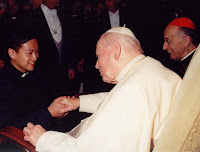
“L’homme n’est qu’un roseau, le plus faible de la nature, mais c’est un roseau pensant.” (“Man is but a reed, the weakest in nature, but he is a thinking reed.”) - Blaise Pascal, Pensées.
The human being is great because of thought. This sums up Blaise Pascal’s treatise on the human being. It was proper of the times he was in—the age of reason which began with the “Cogito, ergo sum” of Descartes.
Some days ago, I showed to my philosophy students the film Inherit the Wind, starring Spencer Tracy, Fredric March, and Gene Kelly. The movie features the famous case of a school teacher who was charged for violating a law against teaching evolution. While the issues that it touched are quite diverse, with themes on Biblical fundamentalism versus evolutionism or religion versus science, I was struck by the fact that it is the thinking human being who was actually on trial. The following lines are worth remembering:
“Then why did God plague us with the capacity to think? Mr. Brady, why do you deny the one thing that sets above the other animals? What other merit have we? The elephant is larger, the horse stronger and swifter, the butterfly more beautiful, the mosquito more prolific, even the sponge is more durable.”
Without prejudice to the reality that it was God himself who has given us dignity, I would tend to hold that the capacity to think is among these gifts that are part of the “glory and honor” that God has crowned the human being. It is that which sets us apart from all creation.
It is my conviction that thinking is a sacred act. It is thus in making our students think that sanctifies education, when we let them share in this divine gift. It is that which bestows durability to the feeble reed. It is “teaching how to fish rather that giving the fish.”
The human mind is a well that never runs dry. Even in an environment of anti-intellectualism, the champions of thought will prevail: for God has plagued us with this capacity to think.

No comments:
Post a Comment